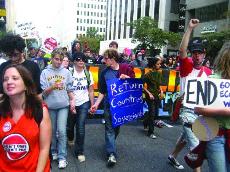On Oct. 19, a rainy Friday night in Georgetown, Washington D.C., police flooded the streets and kept a close watch on Washington Square, where a group of dark-clothed and masked people congregated to march into the heart of Georgetown to shut it down.
They made their presence known to the watchful eyes of the police. During the night a bystander was hit by a stray brick, two arrests were made, and stores boarded up for the weekend.
This was quite a start to the World Bank and International Monetary Fund (IMF) protest, a protest in which Guilford students participated.
On Sat., Oct. 20, a much bigger protest took place, culminating in a march from Franklin Square to Murrow Park where the IMF and World Bank’s offices are located.
Before the march of various types of protestors, including the megaphone wielding and the black-clothed face-hiding, poets and musicians took the stage to share life experiences about coming face to face with imperialism. There were both local stories, including ones about getting equal wages for people, to issues abroad such as conflict diamonds in Africa.
One presenter was an inspirational speaker/poet, Omékongo Dibinga, originally from the Congo.
He spoke about the horrors across his land caused by imperialistic countries and companies.
“I’ve been identified or involved with liberation movements since birth,” Dibinga said.
“Having traveled to so many countries and seen a lot of this stuff first-hand, I think it’s important to draw attention to some of the atrocities that take place in this world.”
Soon there were calls to pick up signs and posters and head to Murrow Park. The megaphone carried the chants of “Whose streets? Our Streets!” and “No More Debt!”
When the march reached its end in Murrow Park, the imposing buildings of the IMF and World Bank were heavily guarded with barricades and police lines. People shouted out toward the employees of the IMF, World Bank and police force.
Some protesters stripped off their clothing, hoping that it would make their message clear. Others danced to the music playing in the background.
As protestors relaxed in the park, tension broke out when police, for unknown reasons, started to arrest a homeless man. Protestors swarmed the police and shouted at them to get out of the park area. After a couple of minutes the protestors surrounded the police, who backed away.
After the tension broke, people declared for the mock trial, in which ambassadors from the IMF and World Bank were to appear, to start. But the delegates refused, so the protestors went over to where they saw the representatives.
When the emissaries refused to participate, they were shouted at by the demonstrators. The police suddenly emerged from behind and whacked people with their batons while other activists fled the scene in fear.
Both parties stood guard, but the chaos ended when the police backed off and the protestors returned to the park.
The trial turned into a debate about the pros and cons of the World Bank and IMF. Many felt the IMF and World Bank weren’t doing what their once original purpose was.
“The protests represent a building frustration with the direction the world is moving towards” said first-year Eric Hawes, a participant in the protest. “(The protest) represents a fight against the reoccurrence of feudalism that any person who wishes to be free should be taking up in one way or another.”

